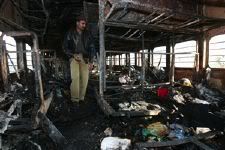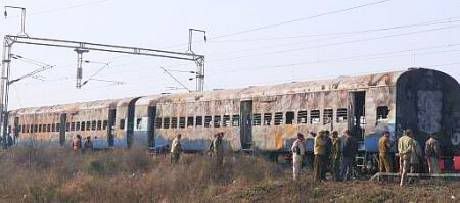Adil Najam
In a tragic development – and what is clearly the most serious threat to recent headways in the India-Pakistan peace process – a train bound from India to Pakistan (Samjhota Express) caught fire, reportedly because of two crude home-made bombs which exploded. Over 60 people are reported dead, most of them Pakistanis returning home, but the death toll also includes many Indians, including some Indian officials.


Here are some details, according to the BBC:
At least 64 people have been killed in a series of explosions and a fire on a Pakistan-bound train in the northern Indian state of Haryana, officials say. Passengers reported hearing two blasts as the train passed near Panipat, about 80km (50 miles) north of Delhi. The train – the Samjhauta Express – was part of a service taking passengers from Delhi to Lahore in Pakistan. A spokesman for Indian Prime Minister Manmohan Singh said the explosions were probably an “act of terror”. A number of other passengers were injured, and officials say the death toll may rise. The Samjhauta Express is one of two train services connecting India and Pakistan. After a two-year gap, it was reopened in 2004 as part of the peace process between the two countries.
Bloomberg adds the following information:
The blasts, which occurred after 11 p.m. last evening, were caused by crude explosives and struck two coaches of the train, India’s Railways Minister Lalu Prasad told reporters today in a televised interview in New Delhi. Pakistan condemned the blasts, saying India must conduct a thorough investigation into the act of terrorism. The train service between Indian and Pakistan is used by people who can’t afford air travel between the nuclear-armed neighbors that fought three wars since independence from British rule in 1947 and started talks to improve relations in 2003. The divided Himalayan territory of Kashmir is at the center of a dispute between the two countries that claim the region in full….
“Preliminary investigations show most of the victims are Pakistanis,” Pakistan’s foreign ministry spokeswoman Tasnim Aslam said in a phone interview from capital Islamabad today. “We expect India to conduct a thorough inquiry to find out the reasons behind this act.” The Pakistan High Commission in the Indian capital is being informed about possible casualties, zonal railways official B.N. Mathur said. A railway guard manning a signal cabin on the route between Delhi and Attari heard two explosions when the train crossed the station near Panipat, a refinery town, Mathur told reporters from the blast site….
India had the responsibility of providing security to the train in its part of the country, Aslam said, refusing to comment on the impact of the blasts on peace talks between the two countries. “We don’t know the motive behind the blasts.”

Pakistan has recently seen a spate of bombings in its major cities, and even before this some in government were pointing towards a ‘foreign hand’ in these bombings. Both countries have long played this game of ‘blame the foreign hand’, including in the recent tragic train bombings in Mumbai. The impulse to do so at the first sign of trouble is a natural one in the sub-continent. Given the deep distrust that exists between the two, it may even be understandable. But irrespective of the short-term political gains such finger-pointing might gain, it is not a very useful way to deal with deep tensions. One certainly hopes that this will not slide to that level and if, indeed, the purpose of those who did this terrible act was to hurt the peace process, then both countries will work together to make sure that this does not happen.
It is a good sign that Pakistan has announced that the visit by the Pakistan Foreign Minister to India will not be canceled. The signals from the Pakistan Foreign Ministry are sober but reasonable. According to The News:
Pakistan Foreign Minister Khurshid Kasuri Monday condemned a train blast in India which killed at least 66 people as a “horrendous act of terrorism” and said most of the victims were Pakistanis. Kasuri said he had asked the Indian government to investigate the incident overnight on a Samjhota Express. “It is a horrendous act of terrorism,” Kasuri told reporters during a function at the foreign office. “I would like the Indian government to investigate this incident. We are waiting for the results of the investigation,” he said. The minister said he had instructed the Pakistani High Commission in New Delhi to send staff to the site to help Pakistan nationals caught up in the blast.
The main leaders in India, including the Prime Minister and President, have also sent the right signals, including condolences to those who have died. The overtures from both sides are to focus on finding the terrorists who committed this atrocity. One hopes that their attentions will remain focussed on this purpose rather than succumbing to the impulse of scoring political points through the unwarranted politics of incrimination. Most of all, one hopes that neither country will allow the peace process to be derailed by this blast.




















































[quote comment=”34914″][quote post=”579″]pologies to anyone feeling frustrated but choosing not to respond for fear of a degenerative discussion.[/quote]
Fear? Kid do you even know what your forefathers had given statments about Kashmir? India and Indians have old habbit to reject their own statments moronically. Few weeks back I made a post about Nehru’s point of view about Kashmir. Read here:
http://kadnan.blogspot.com/2007/02/nehru-and-kashm ir_05.html
It’s intresting to see how nehru made a cunning attempt later and he didn’t fullfil the promise.
And kindly don’t make any silly attempts to offend a religion which you don’t follow. Hindus has a long tradition to demonstrate extreemism but It doesn’t mean I blame hindu teachings because I know that Hindu religion doesn’t promote something which people like ShevSina/RSS and Bajrang preaches by attacking on minorities.
[/quote]
@Adnan — I believe you misinterpreted my comment. I focused on ‘fear’, but it was “fear of a degenerative discussion”. If anything, its a compliment to people that have the courage and sense to stay away from a exchange that displays potential for mud-slinging. My apologies were to such gents.
In my post, i don’t believe I said anything about Islam.
On Nehru, Kashmir, etc – I’m trying to make the best of a bad situation. Both sides view the other as an occupier. Remember that I too was brought up with a ‘full’ map of India, complete with a labeled ‘Pakistan Occupied Kashmir’. It was not easy for me to outgrow that. I did however delve into the details of the conflict since its start, and eventually settled on my most pragmatic theory – land grab theory – as the ray of hope in the mess.
@Akif – I totally missed your t-i-c. So point taken, again!
Many people here had said that maybe this sad incident will begin two countries closer together to fight terrorism together. But maybe this will be the end of the peace process. The Indian governments reaction on Pakistans offer for joint inquiry and also now trying to put the blame on Pakistani itself may will India some points withWest media, but in Pakistan and for us Pakistanis it is a real insult. Those Pakistanis who had wanted to see change for good in India and Pakistani relations will nwo never trust India. For many Pakistanis Indian reaction to this and now blaming Pakistan wil only be seen as another proof that India is not at all serious about peace with Pakistan
Those arrested so far seem to be Muslims; http://www.jang.com.pk/jang/feb2007-daily/22-02-20 07/up04.gif
These could be wrongful arrests but this is the situation so far.
I am originally from tharparkar; hence this input from me. I was actually refering to those living in urban areas. You are refering to those who still have little to do with partition and are completely dependent on rain for their livelihood. One could lose oneself in the romance of their land and their simple and pure culture. They live mostly in the real desert areas and I think are referred to as kohlis. In thar alone from towns like umer kote, kunri, deeplo, mirpurkhas etc there are countless people who would, whenever permissable, visit India. Their reasons to visit India are more religious than anything else. I personally knew quite a few. When you move to karachi and other big cities you will see more of people I mentioned in my previous post. My pick on your post was not critical or with any implication; I just wanted to include this group of pakistanis as well.
A large proportion of the Sindhi Hindu population actually lives in rural Sindh (e.g. Tharparkar district, which was incidentally the only district in pre-independence Sindh with a Hindu majority). Most are desperately poor landless agricultural labourers and can’t afford a trip to India. Most of these don’t have any continuing links with families across the border. There are also poor Hindus (usually from the formerly oppressed castes) across Pakistan who are engaged as sanitation workers. Again, they are often too poor to travel and don’t have linkages. There are, as you say, some Sindhi Hindus in urban areas involved in trading, though their numbers are miniscule and they generally do not travel by the Samjhauta as they are more well-off. These folks do travel across the border for social visits and pilgrimage, but their numbers are very very small.
I think pretty much the only non-Muslims who died on this train would be security personnel (Government Railway Police of Haryana and Railway Protection Force constables). The rest were either Pakistanis from the Mohajir community (maybe also some Punjabis and others), or Indian Muslims with relatives across the border. That is reflective of the general trends in people traveling across the border.